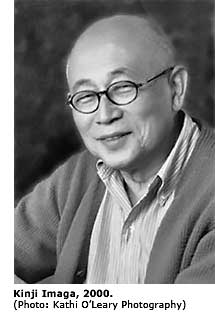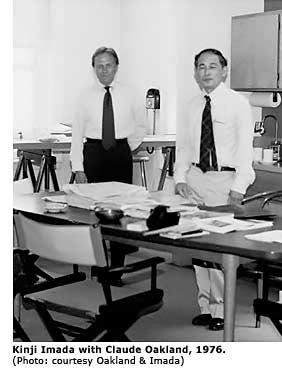In Memoriam: Architect Kinji Imada (1927 - 2005)

Kinji Imada never fit the stereotype of the architect-hero. Soft-spoken, reserved—"serene" is how many friends put it—Imada spent his career as the details man, helping better-known designers create Eichler homes, specifying materials, overseeing construction, modernizing hospitals, crafting a few of his own designs.
Imada, who died in March 2005 at age 77, always down-played his contribution to the Eichler canon, talking instead about the work of his professional partner and close friend Claude Oakland, and about the contributions of Joe Eichler himself. But people who understood Imada's role know better.
"Kinji was the one who got the Eichlers built," architect Marie Laleyan told a gathering of friends at a memorial for Imada shortly after his death. "Without him there would have been no Claude Oakland Eichler homes."
"To do these houses at an economical price, you had to standardize detail and know materials well," she said in an interview. "His knowledge of materials and systems and how to put them together" was crucial to the success of Claude Oakland & Associates, which was later renamed Oakland & Imada. "The reason the buildings have survived is because of Kinji's superior technical knowledge," Laleyan says. Imada was one of the few architects Laleyan trusted to inspect construction on one of her jobs. "I was sure if there was something to be seen," she says, "he would see it better than I would."
Imada's friends remember him less for his architectural accomplishments, however, than for his personal stature. He had strong opinions but never a harsh word for another human being. "He had a combination of serenity and dignity which really suggested he should be a Buddhist monk," his friend lawyer Fred Wyle says. Imada, who was raised in a devout Buddhist home, was not affiliated with a Buddhist church but remained a dedicated Buddhist, his friend Ken Kaji says.
Imada had dozens of friends from many walks of life, and was generous with his time. A few months before he died of prostate cancer, already very ill, Imada spent a tiring day taking visitors from Italy on a tour of San Francisco. "People were captivated by the sense he exuded of decency," Wyle says. "I guess kindness is the best way to put it."
Brilliant, scholarly, well-traveled, a superb cook and genial dinner host, and a middling but courageous classical pianist, as energetic in his 70s as most people are in their 20s, Imada was very sociable, though more listener than talker. He was as passionate about architecture and society as Eichler or Oakland, political liberals who believed strongly that modern architecture could provide affordable housing to people of every ethnicity.
Imada's commitment to liberal causes had deep roots. He was deeply affected by the internment of Japanese-Americans during World War II, and by the bombing of Hiroshima, where his family originated. His grandfather and grandmother perished in the bombing. At age 15 he was herded, along with his parents, a brother, and two sisters, from Fresno to an internment camp at Gila River, Arizona, for Japanese-Americans who were considered potential saboteurs. Imada's father, a gardener, and mother, who ran a sewing school, lost their new home, with its Japanese gardens and fish pond. They had been part of a close-knit Japanese community. The family never returned to Fresno to live, and never reunited.
Imada did well in the camp, graduating from high school, acting in school plays, and serving as student body president. It was a competitive school full of bright kids who were pushed by their parents to succeed, says Min Okina, a fellow student and longtime friend. Students and teachers built their own desks and benches.
In later years Imada rarely talked about the camp, though he took the lead in organizing five Class of '45 reunions for five decades. But the pain he felt at being considered a traitor occasionally came out. Imada told a friend of an incident that happened, not at the camp, but a few months later, when Imada was washing dishes at a boys' summer camp in the Adirondack Mountains. Sugar was missing, and the Japanese servants were suspected. Imada was ordered to open his bags for inspection. As Imada told the story, tears were rolling down his face.

Imada may have been a leader and organizer but he didn't so much plan his career as fall into it. After the war Imada spent a year at Harvard, then joined the Army in part to qualify for the GI Bill. He returned to Harvard after completing his service. Imada served 18 months in the Army, including time in occupied Japan as a clerk with Gen. Douglas MacArthur. While working in Japan, Imada had an emotional visit with an aunt and other relatives in devastated Hiroshima.




